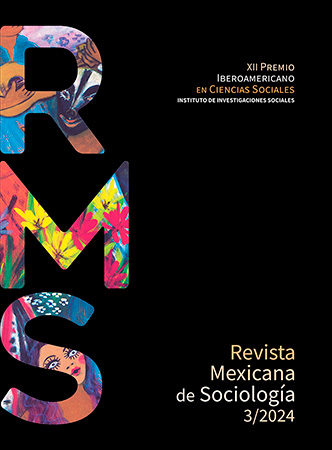“Hacer política”: las mujeres que irrumpen en la política senegalesa
Contenido principal del artículo
Resumen
Descargas
Detalles del artículo

Revista Mexicana de Sociología por Universidad Nacional Autónoma de México se distribuye bajo una Licencia Creative Commons Atribución-NoComercial-SinDerivar 4.0 Internacional. Basada en una obra en http://revistamexicanadesociologia.unam.mx/index.php/rms/.
Citas
Allerton, Catherine (2012). “Making guests, making ‘liveliness’: The transformative substances and sounds of Manggarai hospitality”. Journal of the Royal Anthropological Institute 18: 49-62.
Babou, Cheikh Anta (2007). Fighting the Greater Jihad: Amadu Bamba and the Founding of the Muridiyya of Senegal, 1853-1913. Athens: Ohio University Press.
Baum, Robert M (1999). Shrines of the Slave Trade: Diola Religion and Society in Precolonial Senegambia. Oxford: Oxford University Press.
Bayart, Jean-François (1993). The State in Africa: The Politics of the Belly. Reino Unido: Longman Group.
Beck, Linda J. (2003). “Democratization and the hidden public: The impact of patronage networks on senegalese women” [en línea]. Comparative Politics 35 (2): 147-69. Disponible en https://doi.org/10.2307/4150149.
Candea, Matei, y Giovanni Da Col (2012). “The return to hospitality,” Journal of the Royal Anthropological Institute 18.
Carayol, Rémi (2013). “Sénégal: Aminata Touré, fort tête” [en línea]. Jeune Afrique, 16 de septiembre. Disponible en https://www.jeuneafrique.com/136213/politique/s-n-gal-aminata-tour-forte-t-te/.
Cooper, Frederick (2014). Citizenship between Empire and Nation: Remaking France and French Africa, 1945-1960. Princeton: Princeton University Press.
De Sardan, Olivier (1999). “A moral economy of corruption in Africa?” The Journal of Modern African Studies 37: 25-52.
Derrida, Jacques, y Anne Dufourmantelle (2000). Of Hospitality. Stanford: Stanford University Press.
Diaw, Aminata (2004). “Les femmes à l’éprouve du politique: permenences et changements”. En Gouverner le Sénégal: entre ajustement structurel et développement durable. París: Karthala Editions.
Diaw, Aminata (2009). “La femme entre ordre et désordre publics: les ambiguités de la modernité” [en línea]. Diogène 228: 50-59. Disponible en https://doi.org/10.3917/dio.228.0050.
Ekeh, Peter (1975). “Colonialism and the two publics in Africa: A theoretical statement”. Comparative Studies in Society and History 17: 91-112.
Graeber, David (2012). Debt: The First 5 000 Years. Nueva Jersey: Melville House.
Mauss, Marcel (1947). The Gift: Forms and Functions of Exchange in Archaic Societies. Nueva York: W. W. Norton & Company.
Moya, Ismaêl (2015). “Unavowed value: Economy, comparison, and hierarchy in Dakar”. Hau: Journal of Ethnographic Theory 5 (1): 151-172.
Ngom, Fallou (2016). Muslims Beyond the Arab World: The Odyssey of Ajami and the Muridiyya. Oxford: Oxford University Press.
O’Brien, Donald B. Cruise (1975). Saints and Politicians: Essays in the Organization of a Senegalese Peasant Society. Cambridge: Cambridge University Press.
Pitcher, Anne, Mary H. Moran y Michael Johnston (2009). “Rethinking patrimonialism and neopatrimonialism in Africa”. African Studies Review 52 (1): 125-156.
Riley, Emily (2016). “ʽLock Her Up!ʼ: Corruption discourse and gendered politics” [en línea]. Association for Political and Legal Anthropology. Disponible enhttps://politicalandlegalanthro.org/2016/08/31/lock-her-up-corruption-discourse-and-gendered-politics/.
Riley, Emily (2019). “The politics of Terànga: gender, hospitality, and power in Senegal”. Political and Legal Anthropology Review 42: 110-124.
Sahlins, Marshall (1965). “Economic anthropology and anthropological economics”. Sage Publications 8 (5): 13-33.
Sarr, Fatou (1998). L’entrepreneuriat féminin au Senégal: la transformation des rapports de pouvoirs. París: L’Harmattan.
Sarr, Fatou (2011). Ndate Yalla, Reine Du Waalo 1846-1855. Senegal: Laboratoire de Genre et Recherches Scientifique de IFAN/Université Cheikh Anta Diop de Dakar.
Sarr, Fatou (2013). La 12éme Législature au Sénégal: le premières heritières de la Loi sur la Parité. Senegal: Laboratoire de Genre et Recherches Scientifique de IFAN/Fondation Friedrish Ebert.
Scott, Joan Wallach (2005). Parité! Sexual Equality and the Crisis of French Universalism. Chicago: University of Chicago Press.
Seck, Abdurahmane (2010). La question musulmane au Sénégal: essai d’anthropologie d’une nouvelle modernité. París: Karthala Editions.
Seck, Abdourahmane (2015). “Après le développement: détours paradigmatiques et philosophie de l’histoire au Sénégal” [en línea]. Presence Africaine 192: 13-32. Disponible en https://www.cairn.info/revue-presence-africaine-2015-2-page-13.htm.
Sow, Fatou (1980). “Femmes, socialité et valeurs africaines”. Notes Africaines: Bulletin d’Information et de Correspondance de l’Institut Français d’Afrique Noire 168: 105-112.
Sylla, Seynabou N. (2001). Femmes et politique au Senegal: contribution a la reflexion sur la participation des femmes senegalaises a la vie politique de 1945 a 2001. Memoire de D.E.A. París, Université de Paris 1.
Toliver-Diallo, Wilmetta J. (2005). “‘The woman who was more than a man’: Making Aline Sitoe Diatta into a national heroine in Senegal”. Canadian Journal of African Studies/Revue Canadienne des Études Africaines 39: 340-362.
Touré, Aminata (2013). “Declaración política de Madame Aminata Touré, Primera Ministra de Senegal, ante el Parlamento”. Ponencia presentada en el Parlamento Senegalés. 28 de octubre.
Yuval-Davis, Nira (1997). “Women, citizenship and difference” [en línea]”. Feminist Review 57 (1): 4-27. Disponible en https://doi.org/10.1080/014177897339632.
Weber, Max (1947). The Theory of Social and Economic Organization. Nueva York: Free Press.


